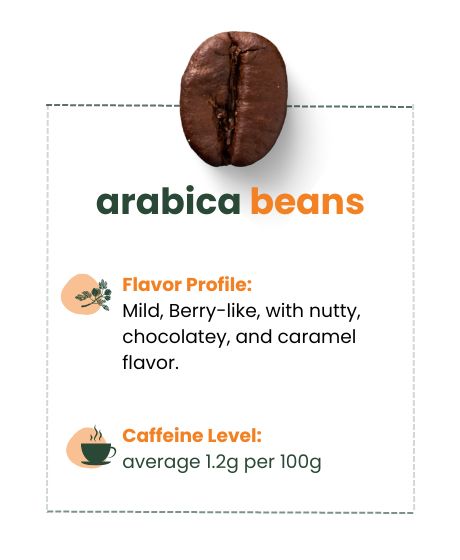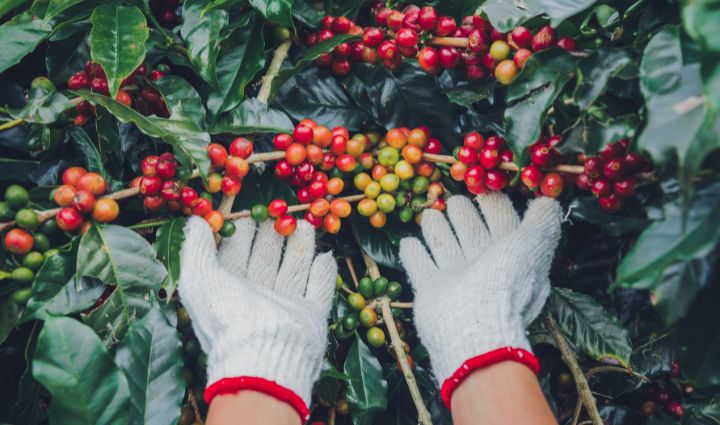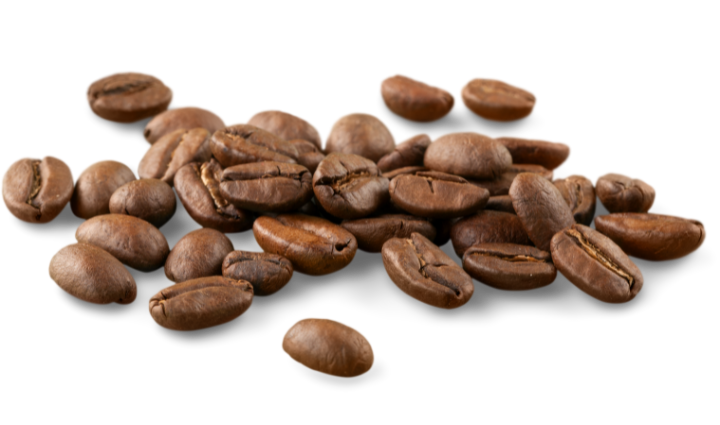Overview
Arabica beans represent one of the four main types of coffee beans. It is widely regarded as one of the most popular and high-quality coffee beans in the world. Here are some in-depth details about Arabica beans:

Origin and Cultivation
Arabica coffee beans get their name from the plant that produces them, the Coffea arabica. The Arabica coffee plant grows naturally in Ethiopia and is one of many plants that are part of the collective term “the coffee plant.” It got its name after crossing the Red Sea from Ethiopia to present-day Yemen and lower Arabia. They then began roasting and brewing it, exporting it throughout the Arab world and then to Europe. The name “Arabica” then only refers to where the coffee was purchased by Europeans, not where it was grown.
Arabica is the most widely grown and dominant bean used today, accounting for approximately 60% of total coffee production. Most gourmet coffees are made from mild varieties of Arabica.
Arabica beans are full-flavored and sweet and usually produce the world’s most-awarded coffee.

Other related article: Types of Coffee Beans
Flavor Profile
Arabica beans are known for their delicate and nuanced flavors. They often possess a wide range of flavors, including floral, fruity, and citrusy notes, along with varying degrees of acidity. The flavor profile can also be influenced by factors such as soil, climate, and processing methods.
Varieties of Arabica
Typica
The Typica coffee bean is known for its clean and sweet flavor profile. It is also considered the most important variety of Arabica beans. Typically, it serves as a “parent bean” in conjunction with other Arabica strains and is crossbred to produce distinct flavors.
Bourbon
Bourbon is acclaimed as the first variety to exist. It is known as the best in the world for specialty coffees, producing a dark, chocolatey flavor that is sweet with very light fruity overtones.
Caturra
Caturra is a hybrid of the Bourbon variety. It offers a slight citrus flavor, with the right amount of sweetness and acidity. It is appreciated for its unique attributes and distinct flavor profile.
Gesha
Gesha Arabica beans are celebrated for their extraordinary and complex flavor profiles. They often exhibit floral, tea-like, and fruity notes, including jasmine, bergamot, and tropical fruits. The taste is often described as delicate, refined, and with a pronounced sweetness. The beans emit a captivating fragrance, often reminiscent of jasmine, lavender, or citrus blossoms. The aroma adds to the overall sensory experience of enjoying a cup of Gesha Arabica coffee.
Growing Conditions
Arabica plants require specific growing conditions to thrive. They prefer a cool tropical climate with temperatures between 15 to 24°C (59 to 75°F) and consistent rainfall. The combination of altitude, temperature, and rainfall helps develop the desirable flavors in the beans.
Cultivation Challenges
Arabica plants are more vulnerable to diseases and pests compared to their Robusta counterparts. They are particularly susceptible to diseases like coffee leaf rust and coffee berry disease. This vulnerability often requires careful monitoring, maintenance, and disease-resistant varieties to ensure the health of the plants.
Caffeine Content
Arabica beans typically contain an average of 1.2 grams of caffeine per 100 grams of coffee beans. However, it’s important to note that caffeine content can vary depending on factors such as the roast level, brewing method, and serving size. Additionally, the caffeine content can differ among different varieties and growing conditions of Arabica beans.
Market Demand
Arabica beans account for a significant portion of the world’s coffee production. They are highly sought after by specialty coffee roasters and consumers who appreciate the refined flavors and complexity. These demands often drive higher prices in the market.
Specialty Coffee
Arabica beans are closely associated with the specialty coffee industry. Specialty coffee refers to high-quality coffee produced with exceptional care, emphasizing the unique flavors and characteristics of the beans. Arabica beans, with their diverse flavor profiles, are commonly used in specialty coffee shops and roasteries to create distinctive and flavorful brews.
Sustainable Farming Practices
Due to the market demand and delicate nature of Arabica beans, many coffee producers have embraced sustainable farming practices. This includes organic cultivation, shade-grown farming, fair trade certifications, and initiatives promoting environmental and social responsibility in the coffee industry.
Arabica beans play a significant role in the global coffee industry, appreciated for their superior taste and complex flavors. Whether enjoyed as a single-origin coffee or blended with other beans, Arabica remains a favorite among coffee enthusiasts seeking a high-quality and nuanced coffee experience.

Pingback: Types of Coffee Beans - Me and My Beans Talk
Comments are closed.